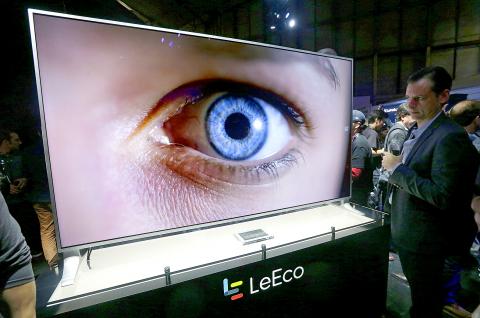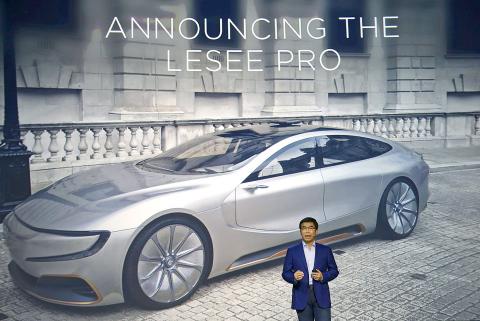Most US consumers have not heard of LeEco (樂視), but the Chinese technology company is setting out to become a household name with smartphones and flat-screen TVs that undercut the prices of Apple Inc, Google, Samsung Electronics Co and other industry stalwarts.
LeEco heralded its entrance into the US market during a showcase on Wednesday in San Francisco, where the company unveiled a sleek smartphone called the LePro 3 that is to sell for US$400 and an Internet-connected TV with 84-inch screen priced at US$5,000.
LeEco positions the LePro 3 as an alternative to Apple’s latest iPhone and Google’s Pixel phone, the prices of which both start at US$650. LeEco is promising its giant TV, called the uMax 85, will be as good or better than other high-end home entertainment systems that cost US$8,000.

Photo: AP
Both the phone and TV are to go on sale on Nov. 2 in LeEco’s online store, LeWeb.com.
Besides the phones and TVs, LeEco also is coming to the US with a virtual-reality headset, a high-tech bicycle and an electric car in a challenge to Tesla Motors Inc.
The company wants to bundle the devices with other services, including an online video package of shows and movies that ties into its origins as the “Netflix of China.”

Photo: AP
LeEco, which stands for “Happy Ecosystem,” is branching out to challenge technology leaders who have been able to demand a premium for their products partly because they have been pleasing US consumers for years.
“The US is the most important global market for us,” LeEco chief executive officer Jia Yueting (賈躍亭) said through a translator during a presentation. “Once we get the hearts and minds of US users, we can move on to the hearts and minds of global users.”
Innovation in the US has hit a “bottleneck,” making it an optimal time for LeEco to enter the market, Jia said in an interview with reporters that was also translated.
He said he envisions creating a platform that enables consumers to hopscotch from LeEco TVs to mobile phones to cars to watch its video service and use other applications that the company plans to introduce.
The company is using the devices as “Trojan horses,” to deliver its digital services, Gartner Inc analyst Werner Goertz said.
“This is a general trend in the industry and LeEco is a prime example of how companies are subsidizing hardware with ulterior motives,” he said.
Google is similarly selling its new Pixel mobile phone in an effort to drive more traffic to its search engine and other services, Goertz said — although that device is being sold at a premium price.
Amazon.com Inc’s Echo, an Internet-connected speaker that understands and responds to spoken language, is also designed to boost sales at the company’s e-commerce site.
The expectations for LeEco are modest.
The research firm Strategy Analytics projects that LeEco will sell about 25 million smartphones worldwide this year.
By comparison, Apple had sold 214 million iPhones in the past year ending in June.
Other Chinese companies that tried to make a splash in the US consumer electronics market have barely made a ripple.
However, LeEco is making a major commitment.
During the summer, the company paid US$2 billion for budget-TV maker Vizio Inc, a well-known brand in the US that sells in Costco and other prominent chains. It employs several hundred workers at its US headquarters in San Jose, California, with ambitions to expand in Silicon Valley. Earlier this year, it spent another US$250 million to snap up a 20-hectare site in Santa Clara, California, where it has approval to build an office complex that could span up to 278,700m2 and accommodate about 12,000 workers.
Jia plans to call the complex EcoWorld.
“They are not taking a half-baked approach,” Goertz said. “But I think they are going to be hemorrhaging money for the foreseeable future. The question is how long they can sustain this strategy.”
Jia, who has accumulated an estimated fortune of nearly US$5 billion, will shoulder a huge chunk of any losses because he owns half of LeEco.
He declined to say how much LeEco has spent in the US so far.
“We are financially prepared to bring a new model and a new value for US consumers,” Jia said.

DIVIDED VIEWS: Although the Fed agreed on holding rates steady, some officials see no rate cuts for this year, while 10 policymakers foresee two or more cuts There are a lot of unknowns about the outlook for the economy and interest rates, but US Federal Reserve Chair Jerome Powell signaled at least one thing seems certain: Higher prices are coming. Fed policymakers voted unanimously to hold interest rates steady at a range of 4.25 percent to 4.50 percent for a fourth straight meeting on Wednesday, as they await clarity on whether tariffs would leave a one-time or more lasting mark on inflation. Powell said it is still unclear how much of the bill would fall on the shoulders of consumers, but he expects to learn more about tariffs

NOT JUSTIFIED: The bank’s governor said there would only be a rate cut if inflation falls below 1.5% and economic conditions deteriorate, which have not been detected The central bank yesterday kept its key interest rates unchanged for a fifth consecutive quarter, aligning with market expectations, while slightly lowering its inflation outlook amid signs of cooling price pressures. The move came after the US Federal Reserve held rates steady overnight, despite pressure from US President Donald Trump to cut borrowing costs. Central bank board members unanimously voted to maintain the discount rate at 2 percent, the secured loan rate at 2.375 percent and the overnight lending rate at 4.25 percent. “We consider the policy decision appropriate, although it suggests tightening leaning after factoring in slackening inflation and stable GDP growth,”

Meta Platforms Inc offered US$100 million bonuses to OpenAI employees in an unsuccessful bid to poach the ChatGPT maker’s talent and strengthen its own generative artificial intelligence (AI) teams, OpenAI CEO Sam Altman has said. Facebook’s parent company — a competitor of OpenAI — also offered “giant” annual salaries exceeding US$100 million to OpenAI staffers, Altman said in an interview on the Uncapped with Jack Altman podcast released on Tuesday. “It is crazy,” Sam Altman told his brother Jack in the interview. “I’m really happy that at least so far none of our best people have decided to take them

As they zigzagged from one machine to another in the searing African sun, the workers were covered in black soot. However, the charcoal they were making is known as “green,” and backers hope it can save impoverished Chad from rampant deforestation. Chad, a vast, landlocked country of 19 million people perched at the crossroads of north and central Africa, is steadily turning to desert. It has lost more than 90 percent of its forest cover since the 1970s, hit by climate change and overexploitation of trees for household uses such as cooking, officials say. “Green charcoal” aims to protect what